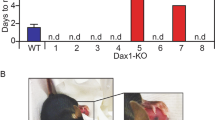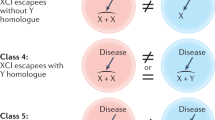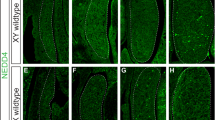Abstract
A Y-linked gene(s) is undoubtedly a prerequisite for testicular development in mammals. However, exceptional cases suggest that the mere presence of the Y chromosome or the Y-linked testis-determining gene does not totally control the fate of the bipotential gonad1. For example, in the mouse, a major as yet unmapped autosomal locus is necessary for normal testicular development and at least one additional autosomal locus is implicated2. We present here a third autosomal sex-determining locus. This dominantly inherited trait, tentatively named T-associated sex reversal (gene symbol Tas), is closely linked to or a part of the T/t complex on chromosome 17 of the mouse. Gonads of chromosomally XY individuals who inherit Tas on the C57BL/6J inbred strain background differentiate as ovaries or ovotestes.
This is a preview of subscription content, access via your institution
Access options
Subscribe to this journal
Receive 51 print issues and online access
$199.00 per year
only $3.90 per issue
Buy this article
- Purchase on Springer Link
- Instant access to full article PDF
Prices may be subject to local taxes which are calculated during checkout
Similar content being viewed by others
References
Lyon, M. F., Cattanach, B. M. & Charlton, H. M. in Mechanisms of Sex Determination in Animals and Man (eds Austin, C. R. & Edwards, R. G.) 329–386 (Academic, New York, 1981).
Eicher, E. M. in Prospects for Sexing Mammalian Sperm (eds Amann, R. P. & Seidel, G. E. Jr) 121–135 (Colorado Associated University Press, Boulder, 1982).
Dickie, M. M. Mouse News Lett. 32, 43–44 (1965).
Bennett, D. B. Cell 6, 441–454 (1975).
Johnson, D. R. Genetics 76, 795–805 (1974).
Johnson, D. R. Genet. Res. Camb. 24, 207–213 (1975).
Eicher, E. M., Beamer, W. G., Washburn, L. L. & Whitten, W. K. Cytogenet. Cell Genet. 28, 104–115 (1980).
Eicher, E. M., Washburn, L. L., Whitney, J. B. III & Morrow, K. E. Science 217, 535–537 (1982).
Babiarz, B., Garrisi, G. T. & Bennett, D. Genet. Res. Camb. 39, 111–120 (1982).
Simpson, J. L. Disorders of Sexual Differentiation, 141–155 (Academic, New York, 1976).
Ohno, S. Monogr. Endocr. 11, 91 (1979).
Forejt, J. & Iványe, P. Genet. Res. Camb. 24, 189–206 (1975).
Hammerberg, C. Genet. Res. Camb. 27, 71–77 (1981).
Theiler, K. The House Mouse, 100–104 (Springer, New York, 1972).
Simpson, E., Chandler, P., Washburn, L. L., Bunker, H. P. & Eicher, E. M. Differentiation (in the press).
Whitten, W. K., Beamer, W. G. & Byskov, A. G. J. Embryol exp. Morph. 52, 63–78 (1979).
Author information
Authors and Affiliations
Rights and permissions
About this article
Cite this article
Washburn, L., Eicher, E. Sex reversal in XY mice caused by dominant mutation on chromosome 17. Nature 303, 338–340 (1983). https://doi.org/10.1038/303338a0
Received:
Accepted:
Issue Date:
DOI: https://doi.org/10.1038/303338a0
This article is cited by
-
Sex–determining genes on mouse autosomes identified by linkage analysis of C57BL/6J–YPOS sex reversal
Nature Genetics (1996)
-
Genetic mapping of the autosomal region involved in XX sex-reversal and horn development in goats
Mammalian Genome (1996)
-
Molecular basis governing primary sex in mammals
Japanese Journal of Human Genetics (1996)
-
Length variation of CAG repeats in Sry across populations of Mus domesticus
Mammalian Genome (1995)
-
Sex and trinucleotide repeats
Nature Genetics (1994)
Comments
By submitting a comment you agree to abide by our Terms and Community Guidelines. If you find something abusive or that does not comply with our terms or guidelines please flag it as inappropriate.



